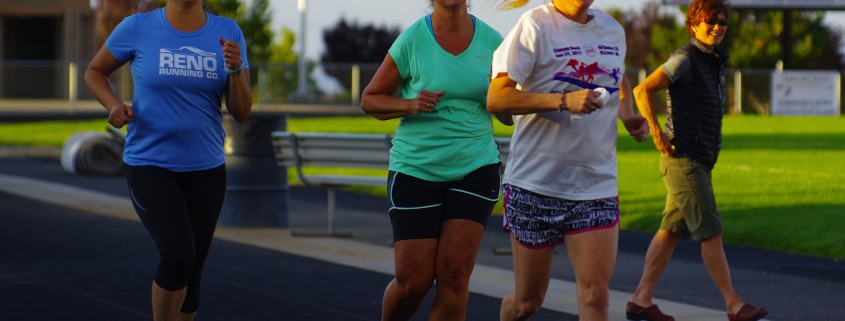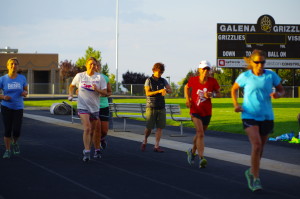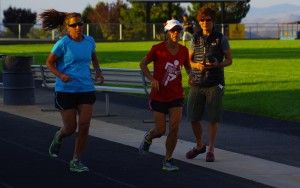Journal Jog Training Plan for Beginning Runners
By Julie Young, Director, Silver Sage Sports and Fitness Lab
The Journal Jog is widely known as a great first 8K for new runners. I mean, any race that features a division for pushing strollers and “caterpillars” — and of course, that encourages costumes — is probably a family-friendly, mostly low intensity event.
But many beginning runners find themselves overwhelmed as to how, and where to start training, as they gear up for a big race.
Every runner, new or experienced, needs to prepare themselves mentally and physically for the specific event’s demands.
The key to tackling the challenge of improving your running performance is first and foremost to stay injury-free.
Just getting out there and running doesn’t work for many people, especially if you’ve been away from exercise for any period of time. So the first step: Find a beginning running plan to follow. There are beginning running programs online, or an even better option may be to find a running coach to help you develop a comprehensive, gradually progressed training plan.
There should be a clear objective to each and every training session, as well as an understanding of how that relates to the goal — in this case, completion of the Journal Jog. Empowered with this understanding, you can train more purposefully, which equates to more effective training and successful results.
Here are a few suggestions for beginner runners to improve the preparation and race experience:
- Individualize your training and make it relative to your individual circumstances: A training plan needs to be based on your past and current training, current fitness and goals, and then gradually progressed as you adapt (this is very individual) to the training.
- Toe the start line mentally and physically fit, injury free and hungry for action: The key to improving fitness and avoiding injury is a gradually progressed training plan.
- Balance sport-specific training with supplemental cross-training for improved performance and injury prevention:
- Focus on consistent hip and trunk stability, and general mobility.
- Cycling, swimming and hiking are good supplemental cross-endurance training tools that will provide mental and physical variety.
- Vary your training, which provides the opportunity to continue to challenge and improve:
- Once a solid endurance base is in place, systematically and consistently include speed and higher tempo workouts in your training plan.
- Train hard and rest hard – rest should be of equal importance to the running workouts
- Quality workouts trump quantity.
- Train to meet the specific demands of the Journal Jog:
- Gradually build up your endurance toward the 8K distance.
- Train at the intensity you hope to hold during the event.
- Simulate the event’s terrain in your training – uphills, downhills and flats all present different challenges.
- Use training to implement your nutrition, hydration and recovery strategies:
- Believe it or not, chocolate milk tops the list for post-run recovery drinks.
- Dial in your race-day nutrition during your preparation, not the week or day before.
- Build your bank account of sleep leading into the race.
Ultimately, the key to successful training is individualizing the plan to efficiently and consistently fit all the training components into life’s priorities of family and work. Individually developed plans also consider how each individual adapts to the training load — to ensure adequate rest to counter-balance the work — resulting in a progressively upward performance trajectory.
Whether you’re looking to complete your first Journal Jog or you want to set your own personal record, Silver Sage Sports and Fitness Lab helps people at all levels of ability. If you have questions about any of these workouts or are just looking for advice, email us at jyoung@o2fitness.net.
Link to: https://silversagecenter.com/sports-and-fitness/






